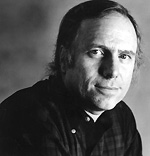There Went the Neighborhood: The American West Since Lewis and Clark
Open gallery

Ian Frazier, author and essayist for the New Yorker magazine, was the keynote speaker for the fourth and final Lewis & Clark College symposium commemorating the bicentennial of the Lewis and Clark Expedition. The theme of the symposium, held September 29–30, 2006, was Legacies. In these edited excerpts from his talk, Frazier muses on some of the legacies of the Corps of Discovery.
Consequences of the Expedition
To mention one legacy: before the symposium, I hadn’t thought about the significance of the geographic place names that Lewis and Clark bestowed all along their journey. This naming, which constituted almost a paving over of hundreds of Indian names, meant that the former names were lost, and in many cases forgotten. It’s sobering, and a little frightening.
We can cite many examples of proximate and later consequences–tangible consequences of the expedition–that were really bad. There is also the much more amorphous consequence of the myth of the American West, which grew dramatically after the explorers returned. Historian James Ronda has called Lewis and Clark’s journals “America’s first great road story.” In publishing terms, the journals were a very big hit. They created a real excitement that enlivened the somewhat vague myth and set it walking … and this myth has been walking around in our consciousness ever since.
Our Unknown History
A very important part of being American, where we have a shallow history that doesn’t go back all that far, is to know there’s a big history that we don’t know, and don’t really have any way of knowing; we just have to acknowledge that it’s there, never forget that it’s there, and respect that it’s there.
Weighed in the Balance
I really wrestled with the question of whether the Lewis and Clark Expedition was a good thing or a bad thing, in light of the changes it portended, the consequences for Native peoples, and this clumsy, beloved, powerful myth that the journals helped to create. In balance, I believe it was good.
The expedition required amazing bravery and persistence, forbearance, skill. In contrast to many disastrous expeditions, it was accomplished almost flawlessly. I have to admire Lewis and Clark even though I know they were flawed people. I know also that a completely opposite opinion exists, and many other opinions at various points on the compass.
If I were looking back at the expedition from the point of view of a Mandan or a Blackfeet Indian, and I imagined an ancestor seeing these guys coming and intuiting what’s going to happen, what could his response be except to wish that these wonderful, intrepid, brave, great people had stayed where they were and not assumed that this apparently empty place was theirs to take?
What We Share
America has always struggled between union and division. Early on, we were a nation inclined to division, but after the Civil War, when the country decided in favor of union, we prospered and breathed a sigh of relief as a nation because it seemed the major, serious division over slavery had been resolved… . Today we live in the Golden Age of Division, but it’s important to think about what we do share.
In the story of the Lewis and Clark Expedition, what do we share? For one thing, we share an argument. People see the Corps of Discovery in a lot of different ways–but that’s not bad. In some countries, the history is so terrible that people don’t even want to think about it, no matter what side they might have been on. The Stalin purges and the like, you know–those are not things people want to bring up again. But we can talk about this episode in our history. Forty-one Indian tribes sent representatives to this commemoration over the four years.
We also share, unavoidably, an unresolvable paradox. The expedition was a heroic achievement and some–but by no means all–of its consequences were dreadful. Thinking about both of these concepts simultaneously taxes the mind, but there it is. As the great American poet Walt Whitman said, “Do I contradict myself? Very well, I contradict myself.” Today the braver and harder choice, it seems to me, is to leave the niche that we’re in and its comforts, its certainties, and step out into the real unknown: the wildly diverse nation of 300 million and the real, nonmythical problems right in front of us that we share.
More L&C Magazine Stories
Lewis & Clark Magazine is located in McAfee on the Undergraduate Campus.
MSC: 19
email magazine@lclark.edu
voice 503-768-7970
fax 503-768-7969
The L&C Magazine staff welcomes letters and emails from readers about topics covered in the magazine. Correspondence must include your name and location and may be edited.
Lewis & Clark Magazine
Lewis & Clark
615 S. Palatine Hill Road MSC 19
Portland OR 97219

